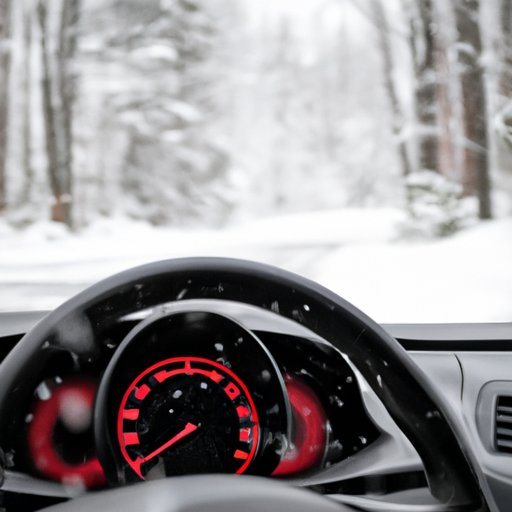
Introduction
Winter driving can be a daunting task, especially when the roads are covered in snow and ice. Knowing how to drive in snowy conditions is crucial to ensure safe travel and avoid accidents. In this article, we will share with you the top 10 tips for safe winter driving.
Top 10 Tips for Driving in Snow
Here are the top 10 tips to help you drive safely in snowy conditions:
A. Prepare Your Car
Before heading out, it’s important to ensure that your car is properly maintained and equipped for winter driving. This includes making sure that your vehicle’s tires are appropriate for snowy conditions. Winter tires are designed to grip the road better in icy and snowy conditions, providing better traction and stability on slippery roads. It’s also important to have good windshield wipers and a functioning heating system to keep you warm and comfortable during the drive.
B. Slow Down and Keep a Safe Distance
When there’s snow on the ground, it’s essential to slow down and give yourself plenty of time to react. Driving at a slower speed and maintaining a longer following distance than usual will give you more time to stop or change directions if necessary. It’s recommended that you stay at least six seconds behind the vehicle in front of you, as it can take much longer to stop on snowy and icy roads.
C. Use Your Brakes Carefully
When driving on slippery roads, sudden stops can cause your car to slide and lose control. Instead, gently pump your brakes to slow down and come to a stop. Another effective technique is to use your engine brake instead of your service brakes where possible, as this will help to slow your car down without causing it to skid.
D. Avoid Sudden Movements
If you want to avoid spinning out or losing control of your car, make smooth and gradual movements when steering, accelerating, and braking. Sudden or jerky movements can cause your vehicle to lose traction on the road, which can be dangerous and even lead to accidents.
E. Stay Alert and Focused
Winter driving can be unpredictable, so it’s essential to stay vigilant and focused on the road. Look out for black ice, snow banks, and other hazards, and adjust your driving accordingly. Avoid distractions, such as using your phone or eating, and keep your eyes on the road.
F. Practice Safe Cornering
When turning on a snowy road, slow down before the turn and don’t accelerate until you’ve completed it. Turning too quickly or aggressively can cause your car to spin out, so make sure you’re taking turns at a safe speed and with smooth movements to maintain good traction.
G. Know How to Get Unstuck
In the event that your car gets stuck in the snow, don’t try to spin your wheels as this can cause them to dig further into the snow. Instead, try to gently rock your car back and forth to gain momentum. If that doesn’t work, try using sand, salt, or kitty litter to give your tires more traction.
H. Avoid Overconfidence
Even if you’re an experienced driver, it’s essential to remember that winter driving is a different animal. Don’t assume that you’ll be able to handle every situation that comes up. Instead, be cautious, and take your time to react to changing road and weather conditions.
I. Stay Home if Possible
The best way to stay safe in snowy conditions is to simply avoid driving altogether. If the weather looks particularly bad, consider postponing your trip or working from home. If you do have to go out, try to plan your route around roads that have been plowed and salted, and give yourself plenty of extra time to reach your destination.
J. Be Prepared for Emergency Situations
Finally, it’s always a good idea to be prepared for the worst-case scenario. Keep an emergency kit in your car that includes items such as blankets, a flashlight, snacks, and water in case you get stranded. Make sure your phone is charged, and keep a charger in your car if possible.
Conclusion
Driving in the snow can be challenging, but by following these top 10 tips, you can stay safe and enjoy the winter season. Remember to prepare your car, slow down, use your brakes carefully, avoid sudden movements, stay alert and focused, practice safe cornering, know how to get unstuck, avoid overconfidence, stay home if possible, and be prepared for emergency situations.




